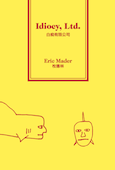
It may be common for a reader to experience the protagonist of the novel he is reading as a kind of refracted version of him- or herself. But this doesn't often happen to me. Nonetheless, it is precisely the feeling I get, strong to the point of uncanny, in reading Bohumil Hrabal's 1977 novel Too Loud a Solitude. It's not that his narrator's life story really matches mine. Rather, it's something more direct. I come a hair's breadth from feeling that this narrator is me. I am Hanta--seated on the other side of a tarnished mirror.
There's something naive about such an assertion, I know. Flaubert may have said, "Emma Bovary, c'est moi," but Flaubert was the writer who brought Emma forth, giving birth, if we're to follow the logic, to himself. But me, I'm not the Czech novelist Hrabal--as writer, I'm a flea in comparison to him--yet his character Hanta is precisely me muddling forward in somewhat different circumstances. Hrabal's tale has grabbed me where I live: not far from the basement, regardless of the floor I may be on.
Willingly I acknowledge, with Hanta, who spends his days compacting wastepaper and proscribed books in a Prague cellar, that I've a subterranean imagination, which doesn't mean I dream only chthonic dreams, but that I dream best when there is stone or clay or soil around me. This link to earth has been defined as typically Capricorn: mining, archeology, alchemy, grave-digging, grave-robbing--all are Capricorn pursuits, and my birth fell mid-January.
But in his spare and beautiful novel, moving with such a light touch, Hrabal has linked the tactile and terrestrial things I so cling to with that other thing I love: books, especially those on the verge of disappearing through the neglect of modern societies. Hrabal's society, the one he satirized, was Leninist communism; mine would be Facebook-era capitalism. Still, for old books the results in both societies are similar: our most precious insights, preserved in our cultures' written traditions, are silenced. Either they are censored and pulped, as in Hrabal's communist Prague, or they are effectively dead, as in my own screen-mediated US.
Manning his noisy compactor with its red and green buttons, a machine that allows him to watch the books and paper as they're crushed, Hanta discovers how to make artwork out of the "garbage". He not only rescues precious books from destruction, surreptitiously taking them home with him, but carefully arranges things in the compactor's drum so that the resultant bales will come out as he intends: each wrapped in Van Gogh's Sunflowers say; or, frequently, featuring German philosophical works opened to key passages. Hanta, we learn, is an avid reader of Kant, Hegel, Schopenhauer and Novalis.
There is a touching dialectic in this novel between Jesus and Lao-Tze, between the great German Romantics and trash, between individual erotic memory and the grind of work. Hrabal manages the motifs and visions that make up Hanta's life with a musical precision. There are similarities to magical realism here, but Hrabal's balancing of the visionary and the everyday shows a surer hand than much of the work described as such. Here follows a fine and characteristic passage from the book's final pages. Hanta is in a Prague pub:
Suddenly the door opened and in stomped a giant reeking of the river, and before anyone knew what was happening, he had grabbed a chair, smashed it in two, and chased the terrified customers into a corner. The three youngsters pressed against the wall like periwinkles in the rain, but at the very last moment, when the man had picked up half a chair in each hand and seemed ready for the kill, he burst into song, and after conducting himself in "Gray Dove, Where Have You Been?" he flung aside the halves of the chair, paid the waiter for the damage, and, turning to the still-shaking customers, said, "Gentlemen, I am the hangman's assistant," whereupon he left, pensive and miserable. Perhaps he was the one who, last year at the Holesovice slaughterhouse, put a knife to my neck, shoved me into a corner, took out a slip of paper, and read me a poem celebrating the beauties of the countryside at Ricany, then apologized, saying he hadn't found any other way of getting people to listen to his verse.Kundera, at some point, praised Hrabal as his country's best writer. I've ordered two more of Hrabal's novels, though I don't expect to be struck so hard as I've been by this beautiful long prose poem. Hanta grabs my ear like no narrator I've read in recent years. I will look up this book's translator too, Michael Henry Heim, who has given Hrabal's novel in a stark and sinewy prose to be envied. Too Loud a Solitude is a great find.

